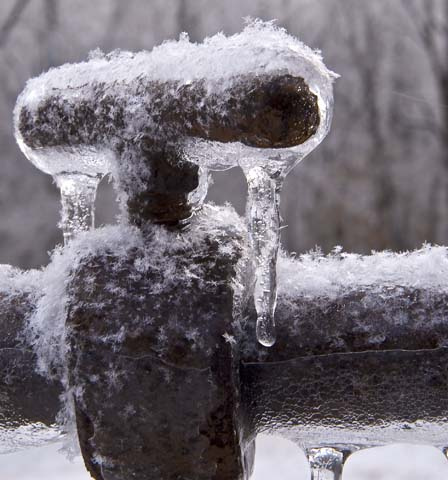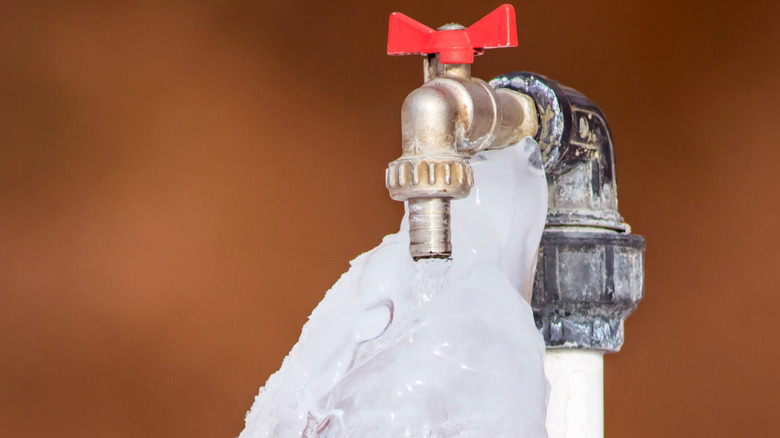Essential Tips for Preventing Frozen Plumbing in Cold Weather Seasons
Essential Tips for Preventing Frozen Plumbing in Cold Weather Seasons
Blog Article
Presented here down the page you will discover a bunch of reliable advice in regards to Prevent Frozen Pipes .

Cold weather can wreak havoc on your plumbing, specifically by freezing pipelines. Below's how to prevent it from occurring and what to do if it does.
Introduction
As temperatures drop, the threat of frozen pipes rises, possibly causing expensive repair services and water damages. Recognizing exactly how to avoid frozen pipelines is important for house owners in cool climates.
Prevention Tips
Shielding susceptible pipelines
Cover pipelines in insulation sleeves or make use of warmth tape to secure them from freezing temperature levels. Concentrate on pipelines in unheated or external locations of the home.
Heating methods
Maintain interior areas sufficiently warmed, particularly locations with pipes. Open closet doors to enable cozy air to distribute around pipelines under sinks.
Just how to recognize frozen pipelines
Look for decreased water flow from faucets, unusual odors or noises from pipes, and visible frost on exposed pipes.
Long-Term Solutions
Architectural changes
Take into consideration rerouting pipelines far from exterior walls or unheated areas. Include additional insulation to attics, basements, and crawl spaces.
Updating insulation
Purchase top notch insulation for pipes, attics, and wall surfaces. Appropriate insulation helps keep constant temperatures and lowers the danger of icy pipelines.
Protecting Outdoor Pipes
Garden hoses and outside faucets
Detach and drain yard pipes prior to wintertime. Mount frost-proof spigots or cover outdoor faucets with insulated caps.
Recognizing Frozen Pipes
What causes pipelines to ice up?
Pipelines freeze when revealed to temperature levels below 32 ° F (0 ° C) for prolonged durations. As water inside the pipes freezes, it increases, taxing the pipe wall surfaces and possibly creating them to break.
Risks and problems
Icy pipes can cause supply of water disruptions, residential or commercial property damages, and expensive repair services. Burst pipes can flooding homes and create comprehensive structural damages.
Indicators of Frozen Piping
Identifying icy pipelines early can stop them from breaking.
What to Do If Your Pipelines Freeze
Immediate activities to take
If you presume icy pipes, keep faucets open up to soothe stress as the ice thaws. Utilize a hairdryer or towels soaked in warm water to thaw pipelines slowly.
Verdict
Protecting against icy pipes calls for positive steps and quick feedbacks. By recognizing the reasons, indicators, and preventive measures, homeowners can secure their plumbing during cold weather.
Helpful Tips to Prevent Frozen Pipes this Winter
UNDERSTANDING THE BASICS: WHY PIPES FREEZE AND WHY IT’S A PROBLEM
Water freezing inside pipes is common during the winter months, but understanding why pipes freeze, and the potential problems it can cause is crucial in preventing such incidents. This section will delve into the basics of why pipes freeze and the associated problems that may arise.
THE SCIENCE BEHIND FROZEN PIPES
When water reaches freezing temperatures, it undergoes a physical transformation and solidifies into ice. This expansion of water as it freezes is the primary reason pipes can burst. As the water inside the pipe freezes, it expands, creating immense pressure on the walls. If the pressure becomes too great, the pipe can crack or rupture, leading to leaks and water damage.
FACTORS THAT CONTRIBUTE TO PIPE FREEZING
Low Temperatures: Extremely cold weather, especially below freezing, increases the risk of pipes freezing. Uninsulated or Poorly Insulated Pipes: Pipes located in unheated areas, such as basements, crawl spaces, or attics, are more prone to freezing. Insufficient insulation or lack of insulation altogether exacerbates the problem. Exterior Wall Exposure: Pipes running along exterior walls are susceptible to freezing as they encounter colder temperatures outside. Lack of Heating or Temperature Regulation: Inadequate heating or inconsistent temperature control in your home can contribute to frozen pipes. PROBLEMS CAUSED BY FROZEN PIPES
- Pipe Bursting: As mentioned earlier, the expansion of water as it freezes can cause pipes to burst, resulting in significant water damage.
- Water Damage: When pipes burst, it can lead to flooding and water damage to your property, including walls, ceilings, flooring, and personal belongings.
- Structural Damage: Prolonged exposure to water from burst pipes can compromise the structural integrity of your home, leading to costly repairs.
- Mold and Mildew Growth: Excess moisture from water damage can create a favorable environment for mold and mildew growth, posing health risks to occupants.
- Disrupted Water Supply: Frozen pipes can also result in a complete or partial loss of water supply until the issue is resolved.
WHY CERTAIN PIPES ARE MORE PRONE TO FREEZING
- Location: Pipes located in unheated or poorly insulated areas, such as basements, crawl spaces, attics, or exterior walls, are at higher risk of freezing.
- Exterior Pipes: Outdoor pipes, such as those used for irrigation or exposed plumbing, are particularly vulnerable to freezing as they are directly exposed to the elements.
- Supply Lines: Pipes that carry water from the main water supply into your home, including the main water line, are critical to protect as freezing in these lines can affect your entire plumbing system.
- Underground Pipes: Pipes buried underground, such as those connected to sprinkler systems or outdoor faucets, can be susceptible to freezing if not properly insulated.
https://busybusy.com/blog/helpful-tips-to-prevent-frozen-pipes-this-winter/

We had been guided to that report on How To Avoid Freezing Pipes through a buddy on another blog. Sharing is good. You never know, you may be doing someone a favor. Many thanks for your time invested reading it.
Go Deal Report this page